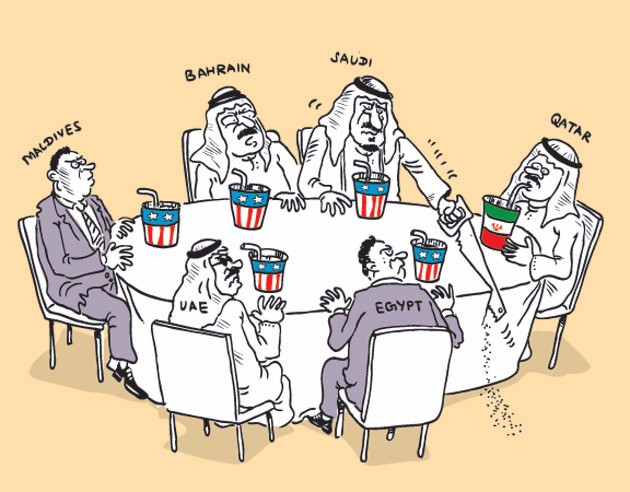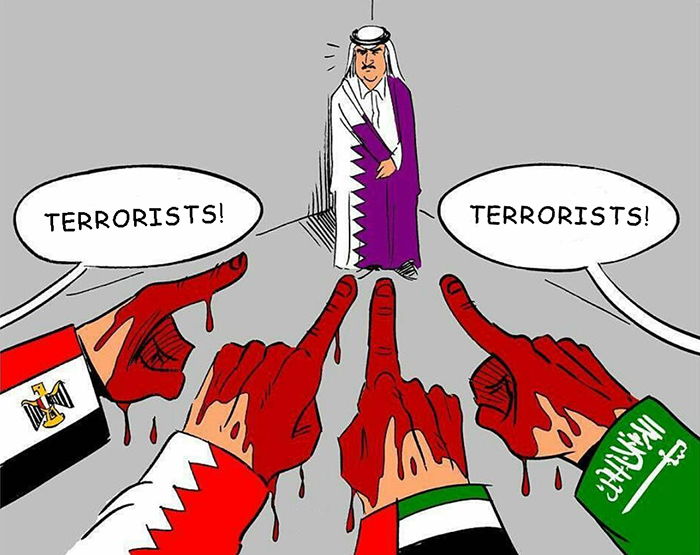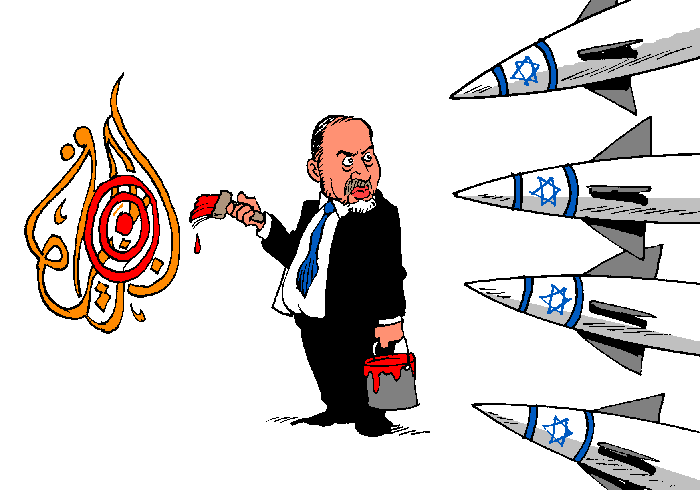Qatar or Israel?
US and Gulf monarchies looking to silence al-Jazeera
Developing Just LeadershipZaakir Ahmed Mayet
Shawwal 07, 1438 2017-07-01
News & Analysis
by Zaakir Ahmed Mayet (News & Analysis, Crescent International Vol. 46, No. 5, Shawwal, 1438)
Contrary to projections in the current media discourse, the genesis of action by several Arabian regimes against Qatar is not to be found in the Persian Gulf region but rather in the State of Israel. Accusations against Qatar have served merely as a means to justify Gulf Cooperation Council (GCC) members’ drastic measures.
The real reasons have roots in the history of the infamous Sykes-Picot agreement of 1916, which provides the current framework upon which the United States, Israel, and the Gulf states are anchored. The term hegemony is used interchangeably, whether rightly or wrongly, to denote Western interests as well as those of Israel and the US. Further, Israel must be viewed as a projection of Western and US interests in the region.
The tools of hegemonic control, that is, destabilisation via proxies and invasions, must also be sketched out. These become crucial in understanding Syria’s role later on. The very foundation the ensured the existence of the GCC is intrinsically connected to Israel. If Israeli hegemony collapses and faces an existential threat to its existence, so too does the GCC. There are close connections between the Gulf culprits involved in the current Qatar row and the State of Israel.
By adopting Israel’s interests as its own, the GCC has demonstrated its dependency on the hegemonic powers as well as exposed the duplicity of Arabian states in relation to the question of Palestine. The picture sketched from largely Israeli and US sources confirms that the very bedrock of Israel — its deterrence capability — collapsed following its 2006 defeat at the hands of Hizbullah. The situation progressively got worse and not only weakened Israel but also by extension, the existence of its dependents: the GCC members.

Focusing on the military encirclement of Israel by Hizbullah and Hamas, the timeline runs between 2006 and 2017 in which the prospect of a liberated Palestine looms large. The picture of Israel, its future existence as a Zionist, apartheid, colonial, settler state becomes critical in the space of 2016–2017 particularly due to Hizbullah’s rising military power. What was the critical tipping point for a change in Israel’s calculation of existence? The Syrian conflict was meant to embroil the government of President Bashar al-Asad in a civil war and destabilisation by hijacking the people’s legitimate grievances. This would have effectively weakened Hizbullah, Hamas, and Iran.
The equation changed dramatically when Iran, Russia, and Hizbullah intervened. The Syrian theatre of operations did not weaken the axis of resistance (al-Muqawwamah – Iran; Syria; Hizbullah,; and even Hamas) but strengthened it. These developments caused panic among GCC states but more particularly in Israel. When viewed in this context, it explains the openness surrounding previously clandestine Arabian ties with Israel as well as the current Qatari crisis.
The Qatari situation, despite the internal dynamics of the GCC, is not spurred by domestic rivalry but a tangible threat to the very framework upon which GCC+1 (Egypt) and the hegemonic front is anchored. Qatar is a trial run to determine if sectarian rhetoric promoted by the GCC+1 is successful in splitting two powerful Islamic blocs: political Islam (Ikhwan) and Islamic resistance (al-Muqawwamah). The verdict has been delivered: the joint efforts of Iran and Turkey spell disaster for the GCC+1 and Israel. Pressuring Qatar, a tiny country with links to both the Ikhwan and al-Muqawwamah, has revealed a mega-bloc significantly increasing the threat faced by monarchs, tyrants, and hegemons.
Ten months before the Qatari siege, Israel and US policy makers, key military figures, and analysts had organized several conferences to discuss the collapse of the hegemony and the danger of the emerging blocs of Ikhwan and al-Muqawwamah. What was not clear was whether or not an alliance would be formed between the two. Qatar was the answer to that question. The greater Muslim East’s future is debatable but the fact is that the entire geopolitical situation has an abstract link to the Gulf and a direct link to Israel.

Recent weeks have been marked by dramatic diplomatic and political moves within the GCC+1 to besiege Qatar. Reasons cited publicly point to e-mail leaks from the Qatari ambassador’s Hotmail account. Allegedly new knowledge of terror sponsorship has emerged. This has allegedly catalysed the GCC states, following Trump’s visit to the region, to take harsh action against Doha. This, however, begs the question: were the GCC states truly unmindful of Qatari support for organisations such as ISIS and al-Nusrah? The factual record provides a vastly different narrative to the one being spun in public. It is commonly known that the Islamic State of Iraq and the Levant (ISIL) (aka Da‘ish) had morphed from al-Qaeda in Iraq.
A strange pattern has emerged particularly in Western countries of “catch and release” procedures. Ironically the subjects of these processes have gone on to commit heinous acts of terrorism. Enter 2006 with Camp Bucca housing future ISIL leader Abu Bakr al-Baghdadi (real name, Ibrahim al-Samarai). The sand is ever shifting with regard to his period of detention as well as the locations at which al-Baghdadi was held. However, there is no dispute that he was in US custody and was “released.” Senior diplomat and author, Hardeep Singh Puri, stated in an interview that Michael Flynn (former national security advisor to Trump and director of the Defense Intelligence Agency under Obama) confirmed the US origins of Da‘ish as a counter to al-Asad. But for US intervention, there would be no Da‘ish. The Hillary Clinton e-mail leaks confirmed that the GCC states (dominated by Saudi Arabia) were funding and providing logistical support to ISIS and al-Qaeda offshoots. In fact, in her private speech to Goldman Sachs, Clinton singled out the Kingdom of Saudi Arabia when she stated, “That’s been complicated by the fact that the Saudis and others are shipping large amounts of weapons — and pretty indiscriminately — not at all targeted toward the people that we think would be the more moderate, least likely, to cause problems in the future…”

Vice President Joe Biden speaking at Harvard University’s Kennedy School of Government in 2014 directly incriminated the GCC states when he said,
Our allies in the region were our largest problem in Syria. The Turks were great friends, and I have a great relationship with Erdogan, [who] I just spent a lot of time with, [and] the Saudis, the Emirates, etc. What were they doing? They were so determined to take down Asad, and essentially have a proxy Sunni-Shia war, what did they do? They poured hundreds of millions of dollars and tens of tonnes of weapons into anyone who would fight against Asad — except that the people who were being supplied, were al-Nusrah, and al-Qaeda, and the extremist elements of jihadis who were coming from other parts of the world.
The most recent US action in protecting ISIS entailed attacking Syrian forces advancing on the terrorists’ stronghold of Raqqa. This is a clear indication of the duplicitous rhetoric emerging from the hegemons.
It can thus be surmised that accusations being levelled against Qatar in relation to groupings such as al-Qaeda, al-Nusrah, ISIS/ISIL and other factions are most aptly described by the English idiom, “the pot calling the kettle black.”
The question then becomes, what criterion was used to single out Qatar as opposed to Bahrain, the UAE, or even Saudi Arabia? The answer is provided by none other than the GCC+1. A leading Israeli publication reported that Saudi Foreign Minister Adel al-Jubeir listed ending support for Hamas and termination of support for the Muslim Brotherhood as conditions for Qatar’s normalisation of ties with the GCC+1. A further demand appears to have surfaced in the whirlwind of reports. A list of ten demands is alleged to exist. When the Deputy Foreign Minister of the Saudi regime was questioned about the alleged list, he refused to comment and retorted that Qatar was aware of what needs to be done to normalise ties with the GCC+1.
The most curious demand relates to the Doha-based television channel, al-Jazeera. Following the August 2013 military coup in Egypt, the Sisi regime targeted al-Jazeera by arresting three of its journalists for covering the Egyptian revolution. Australian Peter Greste, Canadian Mohamed Fahmy and Egyptian Baher Mohamed were arrested and charged with “Being members of a terrorist organisation, as the Egyptian government has designated the Muslim Brotherhood on December 25, 2013; aiding and funding the group; broadcasting false news and reports of civil strife in Egypt; and operating without licenses.”
The charges against these journalists were figments of the Sisi regime’s imagination borne of paranoia. Al-Jazeera was not targeted only in this instance. It was targeted by the overlord of the GCC+1 alliance, that is, the US, during its invasion of Iraq. It was the Bush administration that intentionally targeted al-Jazeera journalists covering the massacre of the city of Falluja. It is alleged that George Bush had tried to convince then Prime Minister and known war criminal Tony Blair to bomb the al-Jazeera headquarters in Doha.
Interestingly, the general who was leading the ground operation against the resistance forces in Falluja was none other than the current US Secretary of Defence, General James “Mad-Dog” Mattis. The visit by Mattis to Saudi Arabia on April 19, 2017 is noteworthy. In attendance was the Saudi Minister of Foreign Affairs Adel al-Jubeir and the former director of operations at US Central Command (Centcom) Navy Rear Admiral Craig S. Faller. As per al-Arabiya TV channel, a topic of concern was the military picture in Yemen. The wording of the topic of the discussion is vital for the latter parts of this overview. It stated, “aims to prevent them from establishing a ‘Hezbollah-like’ militia in Yemen.”
On April 20, Mattis was in Cairo to meet Egyptian President Abdel Fattah el-Sisi and Egyptian Defence Minister Sedki Sobhy. “Counter-terrorism” and securing the borders in a “very complex” security environment were discussed. The location at which the following statement was made provides a matrix of interpretation of the “borders” that were referred to. “We agreed on the need for a renewed and strong security partnership,” Mattis told reporters after arriving in Tel Aviv, the next stop on his visit. The inference that must be drawn is that the border being referred to is the one of mutual interest to both Tel Aviv and Cairo: the Rafah crossing from Gaza.
Both the Sisi regime and Israel viewed al-Jazeera as a common threat. Israeli thought leaders viewed al-Jazeera as a tool of Hamas. In 2014, Professor Eyal Zisser, Vice Rector of Tel Aviv University and Director of Moshe Dayan Center for Middle Eastern and African Studies told the Jerusalem Post with regard to al-Jazeera’s coverage of the Israeli invasion of Gaza; “Al-Jazeera is fully supporting Hamas, and not the Palestinian people.” Zisser said that the Qatar-owned station has been supporting the Muslim Brotherhood and was against the overthrow of former Egyptian Brotherhood president Mohamed Morsi. Qatar also funds Hamas. The issue of Hamas has further implications that will be addressed later.
It is clear that Mattis has a historic axe to grind with al-Jazeera. The Sisi regime views al-Jazeera as a media extension of the Muslim Brotherhood and Israel shares a similar outlook. There is a conflation of interests on all fronts ranging from Hamas and the Muslim Brotherhood to al-Jazeera. It is on this basis that Qatar was selected for the siege by the GCC+1 as well as the United States and Israel.
Qatar also has ties with the resistance bloc of Iran. The common gas fields shared by Iran and Qatar forged a relationship of cooperation between the two countries. The opening of airspace and ports during the current siege of Qatar concretises the conclusion that substantial cooperation exists between Qatar and Iran.
Now that the selection criteria have been clearly defined, that is, Muslim Brotherhood , Hamas, Iran, and al-Jazeera, we can determine what framework we shall utilise to interrogate the current events.
Zaakir Ahmed Mayet is chairman of the Media Review Network of Pretoria, South Africa.

